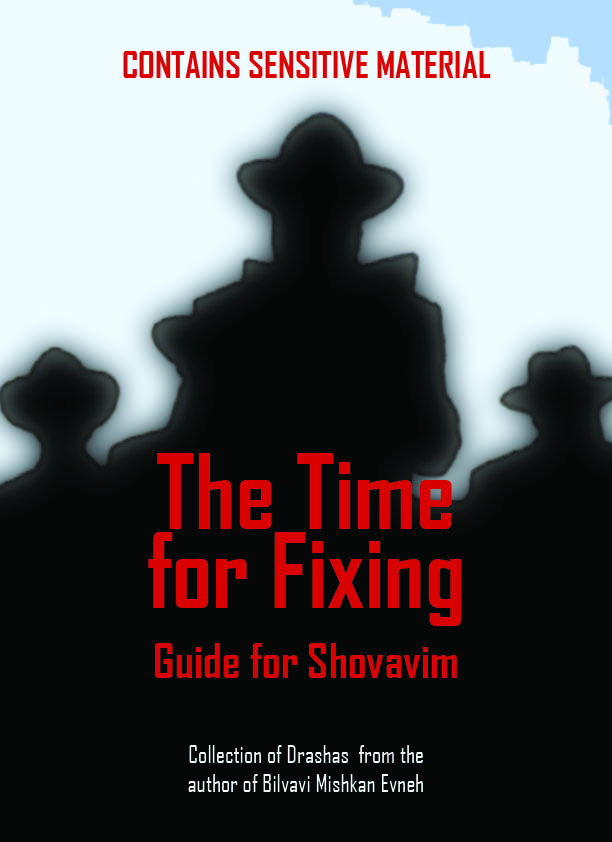- להאזנה דע את מידותיך כח ההתרכזות 007 רוח דמים הגררות המביאה להתלהטות
007 Re-Focusing After Excitement
- להאזנה דע את מידותיך כח ההתרכזות 007 רוח דמים הגררות המביאה להתלהטות
Fixing Your Focus - 007 Re-Focusing After Excitement
- 4722 reads
- Printer-friendly version
- שלח דף במייל
Wind-of-Water: Excited While Becoming ‘Dragged’
With siyata d’shmaya, we will continue here to learn about the power of focus. In this chapter, we will discuss problems with focus which stem from “wind-of-water”.
As mentioned earlier, one of the elements which completely oppose the power of focus is the element of water, which “drags” a person. When a person is pulled and dragged after something, he doesn’t concentrate. “Wind-of-water” means that a person become excited, while becoming dragged.
In general, excitement is a nature of which comes from the element of wind, and when a person becomes excited as he is being ‘dragged’ towards something, this nature stems from the ‘wind’ from within the element of water – hence this lack of focus stems from “wind-of-water”. First the person is dragged, and then he becomes excited, about what he is being dragged towards.
Wind-of-Water – The Excitable, Childish Nature
This nature can be seen in all children. Children become excited easily about something and then become instantly “dragged” into whatever they are excited about. They hear a sound or a siren and they run to go see what the noise is about. They see a new game and excitedly run to go play it. “Wind-of-water” is a very dominant and revealed nature in children, and it controls the child almost completely, without any restraint.
When a person gets older and mature, in most cases, this nature still remains very much revealed – with some, more, and with some, less. We should know that there are also some people who remain with their childish state - mochin d’katnus (small-mindedness) - which causes their “wind-of-water” to remain a dominant nature even in their adulthood. However, in all adults, this nature usually remains revealed, to some extent, and the only question is how much. The issue will depend on how much of an excitable nature the person had since he was a child, which will continue into his adulthood.
Example 1 – Always Buying New Sefarim
The following is an example of this nature, though it is not that common. You can have a person who keeps looking to buy new sefarim. He passes by the vendor of sefarim in the street [which they have in Israel] and he excitedly looks for new sefarim to buy and learn, perhaps sefarim on the daf of Gemara he is learning. It’s as if he already finished the 20,000 old sefarim which are already available, and now he is looking for “new” sefarim….
Why does he keep looking for new sefarim? Apparently, it tugs at his heart. He keeps looking for new sefarim, or perhaps for a newer edition of an already published sefer, but he is not interested in any of the sefarim which are not new but which he does not yet know, because those sefarim are found everywhere. He is looking only for new sefarim.
He starts to open the sefer and he looks at some of the pages, and he is amazed. He reads the introduction and a few words of the sefer, and he thinks to himself, “Wow! This is a sefer which I must buy, and which I must learn.” He buys the sefer, and that night, he learns the sefer before getting into his bed, and the sefer ends up somewhere on the floor…and he never looks at the sefer again.
Maybe he will look at the sefer one more time, or 2 or 3 more times, and he feels that it’s a very prominent sefer, and he says, “Everyone must learn this sefer! My whole family must learn this sefer, and all of Klal Yisrael must learn this sefer from beginning until end.” For some reason, he never fulfills this personal obligation. He continues to feel excited about the sefer, even though he has only read the first thought in the sefer or one wise insight he saw in it. Two days later, he doesn’t even remember one thing in the sefer. He is done learning it, and it is placed on his bookshelf of sefarim, where it joins the “graveyard” of the rest of sefarim on his bookshelf….
A few weeks ago, and he has long forgotten the new sefer which he had been excited so about, and now he sees a new sefer, which he becomes excited about. Once again he feels that he is obligated to buy it. The new sefer discusses how to fix a certain character trait, or it discusses a certain halachah which many people are stumbling in and aren’t keeping correctly, or it explains the wisdom behind the mazalos and the stars (which is mentioned explicitly in the Gemara, yet he is amazed that this new sefer has cited this particular Gemara which contains so much wisdom). He will always find another reason of why a new sefer is very important to learn….
He becomes so excited about the sefer, but he has simply become ‘dragged’ after his excitement towards it, because this excitement is short-lived. There are also some people who have never finished even one sefer, for this reason. They don’t finish anything, for that matter – not the tractate of Gemara they are learning, and not any of the sefarim they buy.
Where does this problem stem from? It is because the person has a nature to become “dragged” after things and then he becomes excited about what’s dragged after. Like the wind which comes and goes, his excitement is only temporary, and sometime later, his “wind” has ceased and he is no longer excited for the sefer.
Example 2 – A Marriage Based Upon Excitement
There is a kind of person who will always become excited about something else, each time. Here is a common example. In those circles where the boy and girl meet each other before becoming engaged, one of them may say, “From the moment we met, I felt that this was my destined mate from Heaven.” Their connection begins with this excitement, and, as times goes on, the excitement eventually weakens, and they find themselves in need of serious help….
He had built the entire relationship based upon excitement, and nothing more. He had simply been ‘dragged’ after this excitement. Eventually, excitement goes away, and then the person is left with nothing.
Many marriages are based upon a feeling of excitement. When the excitement dies down, they may get divorced, because if there is no more excitement, they feel nothing towards each other. Even if they don’t divorce, their marriages become very difficult and complicated, and they really wish they could get divorced - the only reason why they don’t divorce is because they don’t want to become embarrassed in their social circle, or because they don’t want the complicate the lives of the children, and they reason that marrying a different person may not necessarily work out better, etc.
They had based their entire marriage on the original excitement they felt towards each other, and then one day comes where one of the spouses wonders to himself: “How could I have made such a mistake then, in deciding to marry this person?”
A Child With An Adult Body
A person like this remains very much like a child, even in adulthood. A person’s physical body may have grown, and his thoughts may have become more mature, but his very perspective towards life can remain the same as a child’s, when he has a dominant nature of wind-of-water.
The abilities of the mind are called chochmah (wisdom), binah (contemplation) and daas (knowledge, or awareness). A child has very little chochmah, even less binah, and almost no daas, because the power of daas is a mental ability to connect information together, and a child cannot connect.
We must know how to apply the nature of excitement – where to draw the line with this nature, and where it should be applied, and how. First we will give the outline of it, and then explain it more in detail, with siyata d’shmaya.
Proper Excitement Is When There Is Awareness
The nature of excitement, if it is combined with the nature of become “dragged”, will mean that a person will not be aware of what is happening to him as he is in the midst of becoming excited. In most cases, in order for excitement to be constructive, it must be preceded with awareness. This can be achieved in either one of the following two ways:
1) One can have awareness before he becomes excited – meaning that a person is aware that he is about to excite himself (for example, if I am about to learn Torah because I love to learn it, or I am about to awaken a love for the Creator, I am aware before I do so that this will excite
me).
2) Even when becoming “dragged” towards something out of excitement, if I become aware immediately that I have become excited, such excitement will be more balanced and it will not control me.
Awareness After Becoming Excited
The following is a fundamental example that illustrates this idea (of excitement followed with an awareness).
Reb Yeruchem of Mir said that he had given many talks about the topic of emunah, and one day he suspected that perhaps this was all because he had become excited from a talk about emunah which he had heard when he was a child. He felt that perhaps he had become ‘dragged’ after this topic for all of his life, in his excitement. However, now that he had become ‘dragged’ in his excitement, he became aware of it, and now he suspected that he had been ‘dragged’ for all of his life – the excitable nature of wind-of-water.
Sometimes a person is ‘dragged’ after something because Hashem has decreed that this happen. This ‘dragging’ is beyond a person’s control, and it is supposed to happen. However, one still needs to become of it after it happens.
One cannot always prepare himself for all of the excitement he will have in his life. There will be many scenarios where he won’t be able to enter the excitement with any awareness. Often there are scenarios where Hashem has directly brought the person into a situation of excitement, with no time to prepare for it, such as when a person suddenly sees something, hears something, or reads something which excites him.
We can’t make ourselves so rigid and make sure that we only become excited with preceding awareness. Rather, there will be certain situations where we will not become aware of the excitement before we become excited. When that happens, we need to become aware that we have just become dragged after our excitement. The very awareness itself will prevent the excitement from controlling you.
Restrained Excitement
But even more so, the awareness to your excitement afterwards also enables you to provide boundaries to the excitement. Without any awareness, a person becomes dragged after something, and then he becomes excited. He will keep becoming excitable whenever he is dragged after something, each time become excited over something else. If you know people with this nature, you can recognize well that they become very unfocused as soon as something distracts them and excites them.
In Summary
In summary, excitement is proper and balanced either when a person has: (1) The awareness beforehand that he is about to become excited by something; (2) Or, when a person becomes aware of the excitement afterwards.
In addition to this, we also mentioned that a person must learn how to place “boundaries” on his excitement – meaning that a person also needs to learn how to restrain his excitement a bit, so that it doesn’t totally control him.
This is a separate point and it merits its discussion. It enables a person to become limited in his excitement, so that he won’t go overboard in his excitement. It is essentially the power of daas, which is the power to remain connected in your mind to something, the very essence of focus. In contrast to this, excitement is the total antithesis to daas, because it is an absence of focus. The more a person builds his power of daas, the better he can counter the loss of focus when he becomes excited.
Thus, through awareness beforehand that there will be excitement, or through awareness of the excitement after one has become excited, a person already gains a certain degree of focus.
Understanding The Role of Excitement In Our Life
Even more so, though, we should know the following: Where should a person draw the line when it comes to the power of excitement? What are the proper boundaries of becoming excitement?
Excitement certainly has its place. Hashem created this force, so it is certainly constructive, as long as it is kept within the proper boundaries. Only when something is not kept within its proper limitations does it become detrimental.
There are certainly situations where excitement is required, in order for a person to feel connected to what he is doing. I emphasize here that not every situation requires excitement, and only some of them do. In the situations that do require excitement, a person needs the excitement in order to become connected in the first place, to what he is trying to do. Excitement is a path you can use to start becoming connected to something, which can eventually lead you to the actual connection. It is not the actual connection itself – it is a temporary stage you can use in order to get to the real, intrinsic connection.
When people try to connect to something without any excitement, they are only intellectually connected, and the intellect is cold. Although we need the power of cold intellect, which enables us to make rational decisions, it is not actually enough to aid us in our decisions. For example, when deciding whom you will marry, you cannot decide this through cold logic alone. If the decision to marry comes from the intellect alone, a person will begin his marriage from his cold intellect and this is how we will continue into his marriage. How can any spouse live with such a person? Obviously, a person also needs excitement, a warm feeling, when deciding whom he will marry.
Thus, there is definitely a place for excitement. It is just that we need to understand its role. Excitement enables us to have a desire for something, which enables us to begin to connect to something. After that, however, we need to build the connection, and we cannot remain with the excitement alone.
The nature of excitement is rooted in the element of wind. The opposite element of wind is the element of earth. Excitement is the beginning of how we connect to anything, but then we need to build the connection. The power to build comes from the element of earth. Through working with our element of earth, we can then truly build our connection to something. We first begin to connect to something through being excited about it, but after that, we need to build and develop our connection.
Even after we build, we will still need a degree of excitement, to have a warm feeling towards what we are doing. But the main aspect of the connection is through building it, which is a use of the element of earth. Wind, or excitement, enables us to have the motivation to get started. But then we need to mainly “build”, with the “building” being the primary aspect, and the wind\excitement only as an additional aspect.
When one instead tries to turn wind\excitement into his primary aspect and earth\building into a side aspect, this is like the child’s perspective towards life, for a child cannot build.
We see that even when a child builds, he piles a few parts atop each other very quickly and then knocks it all down. Why? Because the child’s primary element is wind, and his wind can come and easily knock down any of his structure\earth. And in fact, the child even enjoys it when anything he builds is knocked down. It is really because the child has no concept of true “building”. Any amount of building which he does is easily knocked down through wind\excitement. This personifies a child. The more a person matures, though, the more he is able to “build”, and his connections to anything are more firm.
Therefore, before you are about to become excited about something and connect to it, you should just be aware that you are about to become excited. After you become excited, you should then “build” an actual connection to it. With the more you build the actual connection, you will become excited again, so keep “building”, then become excited, then “building”, etc. That is the cycle.
But, as mentioned, if the excitement is without any “building”, this is the perspective of a child, who has an immature perspective towards life and who doesn’t engage in real building. But, on the other hand, if there is no excitement, one will not have the drive to build. Therefore, one needs both aspects – a warm feeling of excitement towards what you are trying to connect to, as well as the ability to build.
The Effect of Weak, Temporary Connections On Us
Based upon the above, we can understand the following point clearly: The superficial way of living, which is the childish perspective towards life, is to connect only temporarily to something.
Throughout the day, we keep “connecting” outward to different things, but these are all temporary connections. We get up out of bed, which we had been previously been connected to, and now we disconnect from the bed. We put on our shoes, but later we remove them. We wash our hands in the sink, and soon the water is gone. We take a sefer off the shelf and then put it back, and we are no longer connected to the sefer. We get into the car and then we step out of it. There are countless examples of this idea, where we keep connecting and disconnecting from the same thing.
Why is it this way? Why is it that we keep going through these various connections throughout the day?
Clearly, there are some things we are connected to only weakly, and some things which we are connected to more strongly. For example, if we have a towel by the sink where we dry our hands off, we regularly use this towel, but if there are only paper towels by the sink, we dry our hands with them only once and then they go in the garbage. We have almost no connection to it.
If we compare the different kinds of connections to things that we have throughout the day, we can learn about two different abilities in our soul to connect – the power to connect strongly, and the power to connect only weakly. Which of these is a stronger, more dominant power in the soul?
Although the power to connect weakly is only a temporary kind of connection, it is still being used constantly throughout the day, which makes it become a dominant nature in the soul, causing a detrimental effect on the soul. In this generation, we have many disposable items, which are used once and then go in the garbage. What is the depth behind this? It is because this generation has an attitude of having only a “one-time” connection to anything.
A good example of this, as we mentioned before, is the attitude towards marriage which many people in our generation have. Many people today do not view marriage as a “one-time” use – in other words, they view marriage as something that they can have more than once….and it is really because the very attitude in their soul is to connect only weakly to something. The connection is built on excitement for something, which is temporary, so as soon as the excitement leaves, there is no more connection. Since we are so used to a “disposable”, one-time use for many things throughout the day, our soul gets used to having only weak, temporary connections to something.
Connection is really about permanence. When one has d’veykus (attachment) to Hashem, he is really in a state of absolute focus. This is not a superficial kind of concentration, but a power of concentration which comes from the depths of the soul, the deep power through one which connects to Hashem with.
In the generation we live in, though, people keep making use of a power of connection that is only temporary and fleeting. Another good example of this is the advertisements in the streets which are quickly replaced by new ones. Another example is disposable menorahs. You can add your own examples as well, which we all recognize, which have a one-time use and which are constantly replaced, like a flash of lightning. When people get used to using all of these ‘one-time’ connections, it slowly has an undesirable effect on the soul, and the soul will learn to have only have temporary, weak connections.
If one has already developed his soul’s power to connect deeply to HaKadosh Baruch Hu and to Torah, he has a stable kind of connection in his soul, so even when he goes through countless connections that are weak and temporary, he will remain with this ability to have stable, permanent connection to something. But without this, the soul becomes controlled by all of the weak, temporary and fleeting connections that it experiences, and it won’t be able to have permanent connection to anything. When that is the case, it is then very hard for the mind to remain focused on anything, because the person does not know how to remain connected that long to anything.
Find Something Stable To Connect To
In order for a person to develop the ability of deep focus, he needs to develop a point in his life where he is deeply, permanently connected to something, and it should be something meaningful. In essence, all of our life is really point to focus on – Hashem. This divides into other parts we also need to focus on, which are the rest of the details to our life and our inner work.
First one should choose a point to remain focused on, and he should keep directing it until he reaches the point where all points are unified into one (achdus elyonah, “higher unity”, a state where all is one). This opens the ability in the soul to have deep, stable and permanent connection to something.
Here is a fundamental example of this idea. When it comes to the bond that parents feel towards their children, in many cases (not all of them, but many), the parents do not consciously feel a strong, deep connection to their children. Their love to the children is only awakened from some extreme circumstance, such as if the child becomes ill, or when there is a very joyous occasion, or when the parents greatly need the child to do something for them, which awakens their bond. But in the normal day-to-day relationship with the children, the parents usually have a superficial connection to their children. They will do good things for their children, but they are not inwardly connected to what they are doing for them, so they will only have an external bond with their children, not a deep one.
Another example of this is when it comes to learning Torah, to Hashem, and to ahavas Yisrael. The connection that one must have towards learning the Torah, to Hashem, to all Jews in general, and even to his own inner circle of friends, must include both a connection of both intellect and emotion.
If we take a look at the world, how many people can we see who have even one permanent connection to anything in their life?
Earlier we mentioned the example of marriage, that even if a couple stays married together their entire life, that doesn’t necessarily mean that they have formed a connection of permanence with each other. Even the bond that parents have with their children is usually weak. Often the parents become angry with their children, such as when the children do things against their will or when they don’t listen to them, etc. On a subconscious level, the parent may be strongly connected to the child, but on the consciously revealed level, not only is there no bond with the child, but there are clashes in their relationship.
Where do people feel their strongest connect to, then? In some people, the strongest connection they know of is with their job, if they know that they are well-liked there. But deep down they are afraid they will lose their job. This is not a true connection to it, and it is just a fear of being removed from it.
If a person would examine his life and see if there’s anything he is strongly connected to on a daily basis, in most cases, he would see that there is no such area. If it does exist, it is probably something lustful, or something which provides him with conceitedness or honor. To what is he connected to? He isn’t connected to anything! If he isn’t connected to anything, then what will his soul be focused on….? The soul’s power to focus comes from an ability to have a deep, inner connection to something – both on an intellectual level as well as on a more inner level.
In our times, there are many problems with focus and concentration. This problem always existed, even in previous generations, either stemming from a lack of awareness, or from involvement with many different responsibilities in life, but it can also stem from experiencing constant ‘connections’ to things which are weak and unstable – and that is unique to our generation.
Today, a person goes through so much outer stimuli, one after the other, in quick succession. One moment a person is writing something, then he is in a conversation, then he is reading something – constant “connections” to different things – and all of these are temporary, weak, and fleeting, so they are not stable sources of connection. All of these things do not enable a person to truly be connected to even one thing.
This way of living is a total antithesis to the whole idea of focus. It has detrimental results on the entire spectrum of the soul. One of the noticeable results of this way of living is in how it affects a person’s ability to focus.
Practically speaking, what can one do about this problem?
The truth is that only Mashiach will be able to come and solve all of the problems in our life. In the era of exile which we are found in, there are only a few individuals who can totally separate from today’s lifestyle, but most of the world cannot do this. The changing technology in our world has a very strong pull, and everyone, without exception, feels pulled after it. It is truly unbelievable, but it is the reality today! An advertisement appears and everyone is interested in whatever is being offered. Almost no one puts a halt to everything and says, “Enough. This has to stop.”
In any case, though, every person needs to find at least point in his life where he will form a deep, permanent connection to. It can be a deep, stable connection to Hashem, to Torah, to ahavas Yisrael.
The idea is that one needs to find one fundamental area and choose to connect to it, with permanence. Just having a stable connection to anything is already countering the detrimental lifestyle of today which hampers a person’s ability to focus. Slowly as time goes on, one can keep deepening this permanent connection to something, and he will acquire a stable place in his soul which he can always be connected to.
How Having A Stable, Permanent Connection To Something Improves Your Focus
This also improves the entire inner state of a person. By developing a stable place in yourself where you are always connected to, you will gain the ability to be always focused. As a result of developing this ability, a person will also be able to re-focus after his thoughts or emotions begin to scatter his thinking, because he will be able to quickly return his thoughts or emotions to a stable place in himself, where he is always focused on. (On a deeper level, one can keep returning to the root of his soul, which is the deepest place to focus on, but this is a very high level).
On a simpler and more basic level, a person can develop a stable place in himself which he is always connected to, and as soon as he becomes unfocused, if he has developed some level of awareness (with siyata d’shmaya) and he is aware that he has lost focus, he will be able to quickly return his thoughts to the point where he normally focuses on. In this way, one trains himself to quickly return to a state of focus, as soon as he becomes aware that his thoughts are wandering. He goes from being scattered and unfocused, to being composedand focused, in a cycle. As time increases and he continues this cycle, his power of focus will slowly increase, and his loss of focus will slowly decrease.
Unless a person has a stable place in his soul which he can easily focus on, it will be most difficult for him to re-focus his thoughts as soon as his mind begins to wander. One who develops it, though, will attain a great balance in his soul, which will allow him to easily regain his focus, with siyata d’shmaya. This ability does not fix everything, but it will attribute much to the building of the soul.
Helping A Person Expand His Point of Stable Connection
There is also a deeper use of how we can actualize this idea.
Based upon what we have explained above, we can know another way, of how to help a person who has issues with concentrating and focusing. We need to discover: What area in his life is he strongly connected to and focused on?
Every person has some area in his life which he is strongly connected to, at least on some level [even if isn’t deep and permanent]. For example, every person has someone or something he is happy about, or someone or something that he loves, which he feels a connection to. Once we succeed in identifying it, we can then magnify it and increase it, opening it further, so that we can activate it from its potential state. This will increase the person’s power of focus as well, because it gives a person something he can greatly focus on.
This idea can also be applied to children, in order to help them concentrate better. Understandably, the more mature and the more aware a person is, the easier it will be to make use of this idea, because it can be explained to him and he will be able to relate to it. But even a young child can gain from this idea, when we expand upon the point he is already somewhat focused on.
This particular idea solves many other issues as well, not only issues with focus. Many times a person is lacking inner vitality to his life; he feels dried up inside, bored, sad, unfulfilled, and other negative states. But we can help such a person if we find a point in his life which he feels strongly connected to, and we can help him increase that point and become more focused on it, which will take him out of his inertia.
In general, whenever we help a person do inner work with his soul, there are two different methods. Either we can deal with the negative issues, or we can focus on the positive. When dealing with the negative issues, there are two ways to do this: Either through finding the area that will be the easiest and most practical for the person to work on and improve, or, through locating the most severe issue in his soul and getting him to uproot it as much as he can. This approach is difficult for most people, and only a few individuals have the inner strength to do it.
There is an altogether different approach when working with the soul: “A little light pushes away a lot of darkness.” We can find the most positive point in the person’s life and then magnify it further, so that the person will be focused on it, and then the light of this good will spread to the rest of the person’s soul and improve his general inner state. With particular regards to our discussion, it improves a person’s power of focus, when we find something he is already connected to and we help him expand it further.
Of course, not everything that a person likes should we help him expand on and increase. There may be some negative acts which he finds enjoyable to do, such as enjoying hurting people, which we do want to help him increase. But as a general rule, we need to find one positive area in his life which he feels somewhat connected to, and then help him expand this point further. In doing so, we begin to provide the person with a balance within his soul.
In Summary and In Conclusion
Thus, practically speaking, in order to fix [the problems with concentration and focus which stem from] the impaired element of “wind-of-water” – or the excitement that follows after a person becomes ‘dragged’ after something, causing a person to become inwardly scattered and to have a “childish” perspective towards life – we will need to counter this by going in the opposite direction [of the excitement].
As mentioned, either we can be aware before we are about to become excited, that we are now becoming excited; or, we can become aware of the excitement, after we have become excited. Then one can choose to connect to the excitement or not, which places some restraint on the reaction of the excitement. Even in situations where we need excitement in order to connect to something, we then need to develop the connection, through building a more permanent connection to it.
Along with this, each person needs to find at least one fundamental area of his life where he feels connected to, and to expand it further. This enables a person to have an area where he can easily focus on. Whenever a person finds himself losing focus – whether his thoughts are in turmoil, or whether his emotions are in turmoil - he can become aware of the loss of focus, and quickly regain his focus by returning his thoughts to the area which he can easily and strongly focus on.
We mentioned that children can be helped by this method as well, even though they will not able to work on this idea fully (being that their awareness level is lacking). We can find an area in the child’s life which he feels strongly connected to, and to help him become more focused on that area. This will help him improve his entire ability to focus, and it will also help him attain a balance in his soul in general. As a person gets older and he matures, he is able to become more aware whenever he loses focus, and he will have an easier time regaining his focus, when he has a stable place in himself to always return his thoughts to.
NOTE: Final english versions are only found in the Rav's printed seforim »















